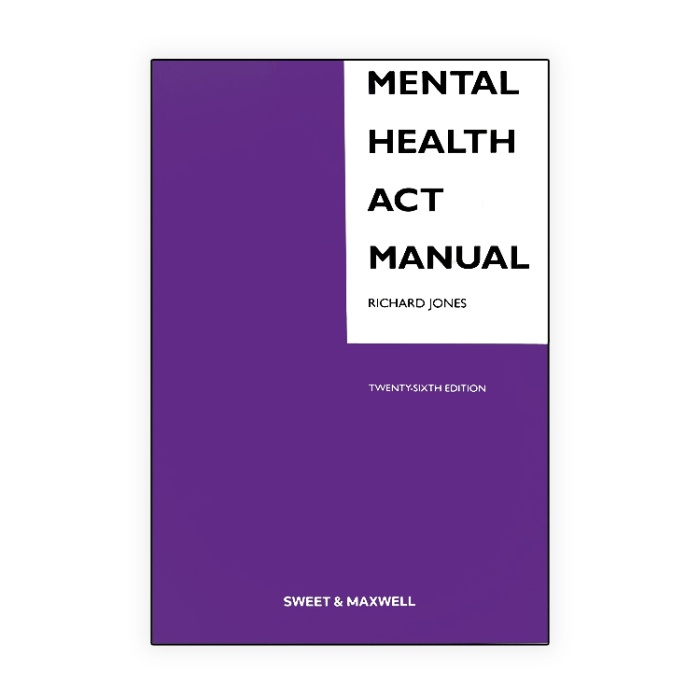
Mental Health Act Manual - 26th Edition
This edition is now out of print
Please CLICK HERE to see the latest edition
The Mental Health Act Manual has been fully updated to cover the latest case law and legislative developments.
This book provides readers with a clear understanding of all aspects of the Mental Health Act 1983. The work is a vital tool for busy professionals requiring insight and guidance in the complex area of mental health law. The Act is reproduced alongside the associated Rules and Regulations, all carefully annotated by Richard Jones.
Features
- Written in a clear, practical style, designed to be accessible to both the medical and legal profession
- User-friendly style: primary and secondary legislation is annotated in the Parts with the analysis of important contextual aspects of mental health law located in the Annexes
- Readers benefit from the expertise and advice of one of the most highly respected individuals in the field
- Includes all the relevant primary and secondary legislation on mental health law with detailed annotations
- An annotated version of the Mental Health Units (Use of Force) Act 2018 is reproduced
- Explains the impact of the 2007 Act, detailing how each section of the MHA 1983 has been affected
- Provides guidance on the Code of Practice.
Major developments covered in the twenty-sixth edition include:
Cases
- R. (on the application of Worcestershire C.C). v Secretary of State for Health and Social Care, where the Supreme Court held that if a patient who was being provided with after-care services under s.117 was discharged from detention and was subsequently detained in the area of another local authority, that local authority became responsible for providing services under s.117 as long as the patient was ordinarily resident there.
- Manchester University Hospitals NHS Foundation Trust v JS and Manchester City [2023] EWCOP 12 which is a seminal judgment on the relationship between the Mental Health Act and the Mental Capacity Act. In this case, HHJ Judge Burrows had to consider the issue of ineligibility under the Mental Capacity Act 2005 and, in particular, Schedule 1A and Case E. Case E is concerned with patients who are “within the scope” of the Mental Health Act but are not subject to it.
- Blackpool Borough Council v HT (A Minor) where Macdonald J. addressed the extra hurdles that must be overcome if a child or young person is the be admitted under the Act to a Tier 4 Child and Adolescent Mental Health Services bed.
- R. v Walker where Dingemans L.J. considered when it would be appropriate for a court to sentence a mentally disordered offender to a section 45A “Hybrid Order”.
- R v Francis Junior Wellington (AG’s Reference No 1 of 2021 under s36 Criminal Justice Act 1988), a case where the Court of Appeal considered the impact of a mentally disordered offender’s culpability on sentencing.
- Norfolk and Suffolk NHS Foundation Trust v HJ which identified the principles that apply to an assessment as to whether medical treatment provided to someone in lawful detention amounts to a further deprivation of their liberty. This case also considered whether a patient’s gastrointestinal illness came within the scope of s.63 of the Act.
- R. (on the application of Maher) v First-tier Tribunal (Mental Health) where Stacey J. considered the relationship between the presumption of privacy in cases involving the mental health of a patient and the open justice principle. The judge held that the Deputy Chamber President had acted unlawfully when she decided not to provide a victim with the reasons for the tribunal's decision to order the conditional discharge of the patient.
Legislation
Reference is made to a new legal framework introduced by the Police, Crime, Sentencing and Court Act 2022 which allows for the remote access by non-participants to proceedings, including tribunal proceedings, that are to be held in public.
| ISBN | 9780414115804 |
|---|---|
| Publication Status | Out Of Print |
| Publication Date | 2023-09-29 |
| Edition | 26th |
| Format (Paperback, Hardback etc) | Paperback |
| Publisher | Sweet & Maxwell |
We offer customers a wide range of delivery options from Free (7-10 working days) ... right up to by Next Day by 9am (subject to location and stock availability).
- Simply choose your preferred service when checking out
- We show "live" stock levels for all publications
- Orders received after 3:45pm will be processed on the next working day.
- Unless specifically requested, our delivery partners will not attempt a weekend delivery
We offer all customers a "No Quibble" 28 day returns policy.
If you need to return a title for any reason ...
- Contact our customer services team first to explain what you are returning and the reason
- Request a Returns Authorisation Number
- We will email you this and a link to arrange your return quickly & easily via Royal Mail
- Take your return to your nearest Post Office and they will do the rest
Please refer to our Returns page for full details & charges.